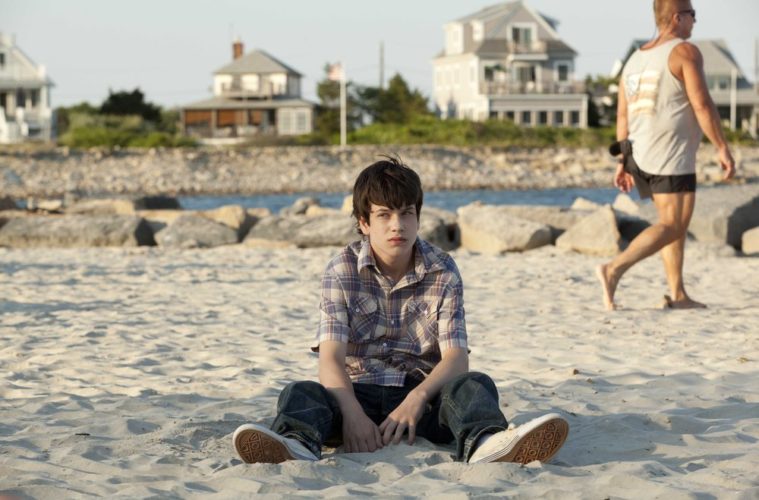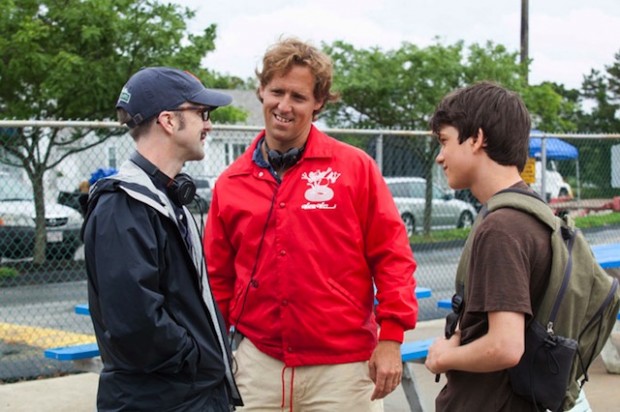
In theaters now is The Way, Way Back, a touching comedy that feels at home being both drama and cathartic release with a sense of humor. Leave it to the Oscar-winning writing duo of Nat Faxon and Jim Rash to pull from real life absurdity and pain to give us their directorial debut in a package that is unafraid to be itself. With Steve Carell, Allison Janney, Sam Rockwell, Toni Collette and a host of newcomers, there is plenty of acting strength to pull the film through rough spots of honesty. Last month I had the privilege to sit down with Faxon and Rash in a roundtable to talk about their small independent film, the struggles of shooting in an open waterpark, the casting, how Allison Janney is an endless ball of energy, what Jim Rash’s comfort food is, and how they grew to be the writing duo they are. Check out our conversations below.
This film was in the works, or at least the idea was, well before The Descendants. A part of it came from your own life. The opening, in fact. Was this a bit of catharsis for you?
Jim Rash: Absolutely. But we’ve mined it before. We did a television show. The very first thing we wrote. It was called Adopted. And I’m adopted as well. So we keep pulling, not just from me. I think that when people ask you your point of view and what makes you laugh…what’s funny and what’s interesting to you is usually coming from something that might have been painful and difficult when you were going through that at the time, but when you have context and you’re able to look back at stuff, I find that stuff the most interesting and so cathartic is exactly what it is. It’s a chance to revisit moments and look back at how lucky you were despite how dramatic it might have been at the time.
Nat Faxon: There’s such a thin line between something that can be tragic and something that can be very funny. Often times you need that release to get through it or understand it or put it into perspective.
So, you have been working together for a while now. Did you write separately before this?
Rash: I certainly was taking screenwriting classes and courses through college. I started writing probably really horrible things and continue to write really horrible things. So still, it’s a love/hate thing with writing. But we came through The Groundlings program, which is a sketch comedy and improv theater in Los Angeles. That’s where we met. That’s a very intensive writing. You’re writing constantly. Our shows changed every three months. So we were constantly writing bits and both of us wrote sketches by ourselves and sketches with each other and with other performers in The Groundlings. So the fact that we sort of became exclusive…
Faxon: Aw, that’s nice.
[Everyone laughs]
Faxon: No, I’m not seeing anyone else.
Rash: Well, I’ve got my feelers out…
Faxon: Son of a bitch.
[Everyone laughs]
Rash: So obviously when Nat was in school he was writing as well. So we’ve always had the bug. But I think we just found a knack for writing together that seemed to work. And it is nice having a partner. I think we both enjoy both sides but for the most part it’s us now.
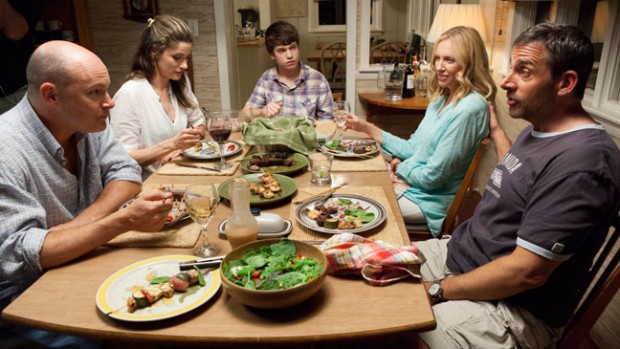
With that background in improv, how much do you use it when writing and directing for the screen?
Faxon: A lot. I think having that background with The Groundlings where you sit in rooms and throw out different ideas and then someone latches onto something and you build off of it. You brainstorm. Often times that’s what Jim and I’ll be doing in a room or at a coffee shop, going back and forth and building on something. Inevitably we forget to write it down and we forget what the bit was. [Laughs].
Rash: But we had a good time doing it.
Faxon: But I think a lot of that makes its way into everything that we do. Certainly as actors and trying new things. Obviously in writing when we’re coming up with the material. And then in directing I think it’s important. All the rules you learn in improv can be applied to when you’re doing something creative. Making sure you’re listening to other people and taking what they said and adding to it. Not denying or negating someone.
How did you work out the details of co-directing and were there any flare-ups?
Rash: It’s funny, because we lived in the same house while we were shooting. We were in this small area called Green Harbor. It was me, Nat, and his wife and two kids and our producing partner Kevin and his girlfriend, Nat’s sister-in-law. And, of course, Nat is an extrovert so he has more friends than anyone deserves to have.
[Everyone laughs]
Rash: So he derives his energy from other people. He’s very infectious that way. So there was revolving door of friends arriving day by day. And I’m a highly stressed, neurotic person and there was only one bedroom left. Which was not a bedroom. It had no door. It was the top floor of this place. It was a landing. You’re supposed to just look out at the ocean. It’s not meant for a bed but that’s where I was. So his sweet, sweet, wonderful daughter, Ruthie, would always wake me up and want to visit and explore. So that was probably the most stressed I was. But what was great is that Nat knows that I’m a creature of habit. I have a meal that I like to eat. So I would just make my meal. I’m probably giving you more information than I’ve given anybody.
What was your meal?
Rash: Well, he’s going to laugh, but it wasn’t like I eat this meal everyday. But I wanted to have a meal that I would eat back in Los Angeles that you just always go to and it made me feel OK. I don’t know if you guys know of mochi, not like in ice cream but this is the puffed rice version. It just puffs in the oven. So it’s a little brown rice thing. I love those things. So I would travel many, many exits to get to a place where you could buy them, and so I would have that and some chicken. [Laughs]
Faxon: So, the question was, “How do you two direct each other?”
[Everyone laughs.]
Rash: I know! But we were talking about the stress.
So that was your blankie.
Rash: Yes. My blankie.
Faxon: Your blankie was your chicken and your mochi.
Rash: But I survived.
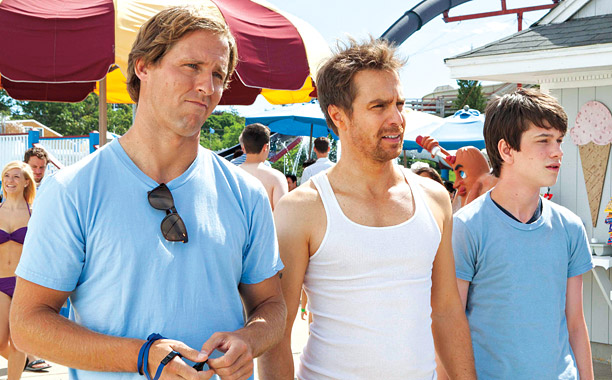
You’re working with a lot of high-powered actors. Allison Janney was amazing — she has like this five-minute monologue. Did you ever feel like you had to go in and say something to her or just let her go?
Faxon: No.
Rash: She did it over and over again.
Faxon: We shot that scene when they first arrive at the house and she just lets loose, filling us in on everything that’s happened over the year. We did that all day and she just had the same energy from the start of the day to the end of the day. It was just incredible to watch. She’s just so much fun and hilarious that you just let her loose and do her thing. The character was sort of inspired by those Christmas letters that you get that are Xeroxed copies of people telling you everything that’s gone on in the past year — the tinniest achievements. Little Bobby got a hit in his Little League team; Bob got a promotion. But we had a friend that got one that was negative. That was sort of brutally honest about things that did not go well.
Rash: No filter.
Faxon: Yeah, it was inspiration for someone that has too much information. I think Allison certainly connected with that and knew people that just don’t know how to shut it off.
Rash: Plus, West Wing probably trained her for the type of speeches we were throwing at her.
Is it true that Octavia Spencer introduced you to her?
Rash: I can’t remember if Octavia… I think our connection came via Melissa McCarthy, who knows Allison and Octavia. Weird circle. Many, many, many years ago Sandra Bullock was making a small independent movie called Making Sandwiches, like a small short film. Octavia was in it and I don’t know if Melissa was in it. But it was one of those weird connections where I knew a college friend and met all them and then we met back up with Melissa at The Groundlings.
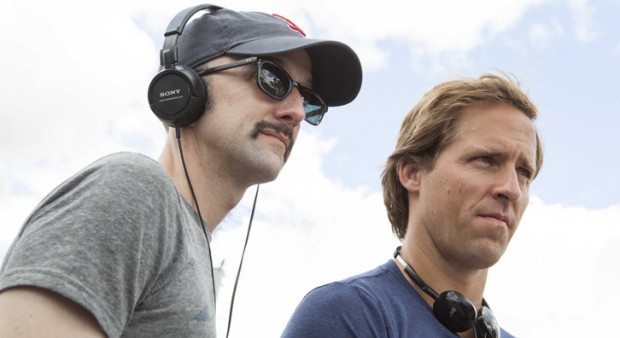
Did you have people in mind for the cast already?
Rash: We had Allison in mind, so we wrote Betty for her. Then Maya.
Faxon: We knew her from The Groundlings and are old friends with. The idea of working with friends was something we loved. Then we just tried to think of people we long admired and respected. Steve Carrell came to mind pretty fast because we needed Trent to have an innate likability. He also recognized and wasn’t afraid that he was playing a character that doesn’t have the traditional arch where he starts one way and evolves to this lesson. But rather a tragic male character who’s stuck in this vicious cycle created by himself. He proclaims he wants to change and even says, “I have to be better.” He’s his own worst enemy. He trips and he’s self aware of that major flaw. I think that might have to do with his dad and how he was raised. But he recognized that. The fact that there’s a sympathy for someone like that where you don’t necessarily want them in your life but you say, “I certainly hope you find what you’re looking for and change, because you’re going to be alone.”
And Liam [James], he is just kind of naturally like that?
Faxon: He is. In fact, when he walked into the audition, he said, “This IS me.” This character. Not in the sense that he had a troubled upringing. His parents are delightful. But I think he is an introvert and a self-proclaimed old soul and walked in with that concave chest, hunched shoulders, and a pale look. Shuffled in. He felt very much like our kid without having to act like a kid.
I’m curious if you tried to cast anyone from Community? It seems like you have a wealth of characters and actors there. Did no one really fit the part or did you have to resist the urge to cast some?
Faxon: I did! I did.
[Everyone laughs]
Faxon: I said, “No one from Community will be on this.”
Rash: “No one from Ben & Kate, and no one from Beerfest.”
[Everyone laughs]
Rash: No, believe me. If parts felt right for more people, we’d have filled it with people we respected as actors and people. That’s easy. It really was one of those movies where we didn’t have many parts that were perfect for the people that were around us. But that’s all we think about for our next projects and beyond.
Faxon: Yeah, working with friends.
Rash: Who can we bring to the table that we love working with. Both that we know and those that people need to know.
Can you talk about filming at the water park? That must have been a challenge.
Rash: It was.
Faxon: It was open.
Rash: Yeah, we couldn’t afford to close it. They make more money being open than a small independent movie can pay them. They’re barely open during the year. They’re open, like, three months. But it was great family-owned waterpark. They couldn’t have been more helpful. So we would shut down areas. A ride or just an area. Some of our crew would wear the Water Whizz staff uniforms so we could have them in the shots acting as if they worked there in order to move the regular crowd along.
Faxon: Plenty of lookie-loo people. “Heyyyyyyy.”
Rash: Then, obviously our sound department worked overtime to battle the water and the screaming kids who do not care that you are shooting. And do not need to be quiet.
“Quiet on the set!”
Rash: Yes. Do not understand it and don’t need to. But Water Whizz is the actual name of the place and they asked us to keep their name and we were more than happy to. It’s just one of those places. There’s so many places now that are obviously connected to a Knoxberry or Six Flags or are grand and huge in scale. And this was grand and huge in scale, but felt very much like the ones we grew up on. Simple, old-school, and local.
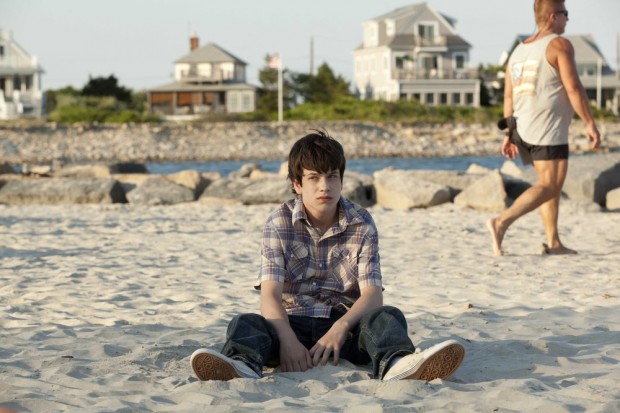
The Way, Way Back is now in limited release.

